The Plant Sterol Supplements Market is estimated to be valued at USD 2.2 billion in 2025 and is projected to reach USD 3.7 billion by 2035, registering a compound annual growth rate (CAGR) of 5.5% over the forecast period.
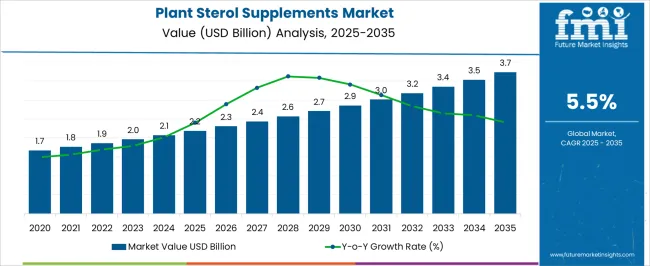
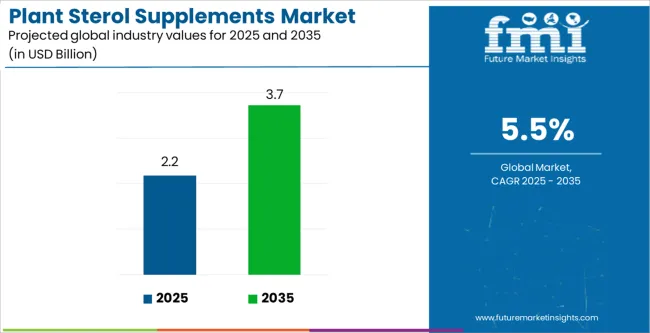
| Metric | Value |
|---|---|
| Plant Sterol Supplements Market Estimated Value in (2025 E) | USD 2.2 billion |
| Plant Sterol Supplements Market Forecast Value in (2035 F) | USD 3.7 billion |
| Forecast CAGR (2025 to 2035) | 5.5% |
The Plant Sterol Supplements market is witnessing steady growth, driven by increasing awareness of cardiovascular health and the benefits of cholesterol management. Rising incidences of hypercholesterolemia and related health conditions are motivating consumers to adopt preventive dietary supplements. Pharmacies and drugstores are serving as primary distribution channels, providing easy access to high-quality products and professional guidance on consumption.
Advances in formulation technologies, including improved bioavailability and incorporation into functional foods and beverages, are enhancing product efficacy and consumer acceptance. Additionally, the growing preference for natural and plant-based health products is supporting market expansion. Government initiatives promoting heart health and preventive care are further encouraging adoption of plant sterol supplements.
The rising number of health-conscious consumers seeking evidence-based nutrition solutions is creating opportunities for brands to expand distribution networks and improve market penetration As public interest in managing cholesterol and supporting cardiovascular health continues to rise, the market is expected to experience sustained growth, driven by product innovation, increased accessibility, and rising consumer education.
The plant sterol supplements market is segmented by distribution channel, and geographic regions. By distribution channel, plant sterol supplements market is divided into Pharmacies/Drugstores, Health & Beauty Stores, Hypermarket/Supermarket, and Internet And Direct Selling. Regionally, the plant sterol supplements industry is classified into North America, Latin America, Western Europe, Eastern Europe, Balkan & Baltic Countries, Russia & Belarus, Central Asia, East Asia, South Asia & Pacific, and the Middle East & Africa.
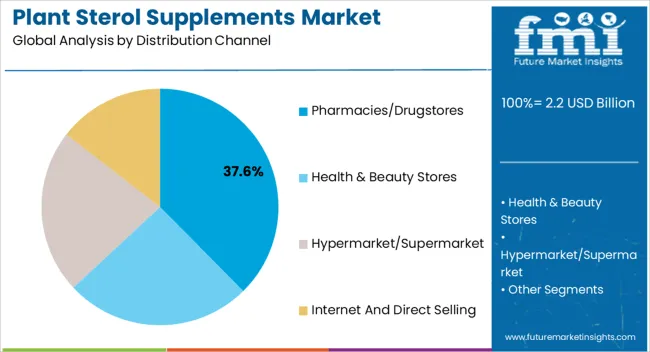
The pharmacies and drugstores segment is projected to hold 37.6% of the market revenue in 2025, establishing it as the leading distribution channel. Growth in this segment is being driven by the accessibility, reliability, and professional support provided to consumers. Pharmacies and drugstores offer a wide range of plant sterol supplements with verified quality, safety, and labeling compliance, which enhances consumer confidence and adoption.
The presence of trained staff allows customers to receive guidance on dosage, product selection, and potential interactions, making this channel highly preferred over other alternatives. In addition, the integration of these products into established retail networks and loyalty programs strengthens reach and customer engagement.
Increasing partnerships between supplement manufacturers and pharmacy chains are also improving product availability and visibility As consumers continue to prioritize convenience, credibility, and expert advice in their supplement purchases, pharmacies and drugstores are expected to maintain their leading role in distribution, supporting overall market growth and driving higher adoption rates of plant sterol supplements.
Plant sterols are naturally occurring substance found primarily in grains, fruits, vegetables, legumes, nuts and seeds. The three most abundant plant sterols are beta-sitosterol, campesterol, and stigmasterol. Plant sterol enables to lower cholesterol level in body.
Due to this plant sterol is gaining importance in various application such as in food, beverages and dietary supplements. Plant sterol supplements are primarily consumed by the consumers who are seeking to lower their heart diseases. Rising inclination of consumers towards the healthy life style, doctor’s recommendation to consume at least 2 grams of plant sterols per day, increasing consumption of heart health supplements are some the key drivers which is expected to support the market growth over the forecast period.
Consumption of plant sterols has been clinically proven to reduce cholesterol. In fact, a ‘Consensus Statement’ supporting this from the European Atherosclerosis Society (EAS) was published in its journal, Atherosclerosis. In it, the EAS found that "two grams of plant sterols or plant stanols per day in functional foods can help manage cholesterol for those with moderate heart disease risk and who are taking statin drugs."
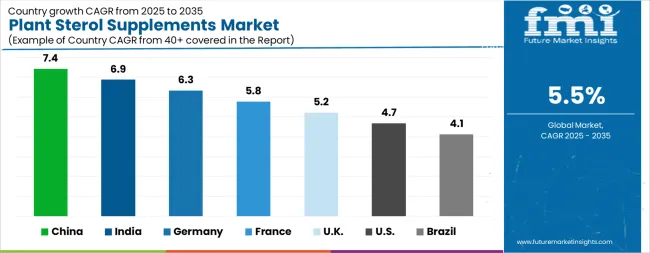
| Country | CAGR |
|---|---|
| China | 7.4% |
| India | 6.9% |
| Germany | 6.3% |
| France | 5.8% |
| UK | 5.2% |
| USA | 4.7% |
| Brazil | 4.1% |
The Plant Sterol Supplements Market is expected to register a CAGR of 5.5% during the forecast period, exhibiting varied country level momentum. China leads with the highest CAGR of 7.4%, followed by India at 6.9%. Developed markets such as Germany, France, and the UK continue to expand steadily, while the USA is likely to grow at consistent rates. Brazil posts the lowest CAGR at 4.1%, yet still underscores a broadly positive trajectory for the global Plant Sterol Supplements Market. In 2024, Germany held a dominant revenue in the Western Europe market and is expected to grow with a CAGR of 6.3%. The USA Plant Sterol Supplements Market is estimated to be valued at USD 819.6 million in 2025 and is anticipated to reach a valuation of USD 1.3 billion by 2035. Sales are projected to rise at a CAGR of 4.7% over the forecast period between 2025 and 2035. While Japan and South Korea markets are estimated to be valued at USD 105.3 million and USD 75.0 million respectively in 2025.
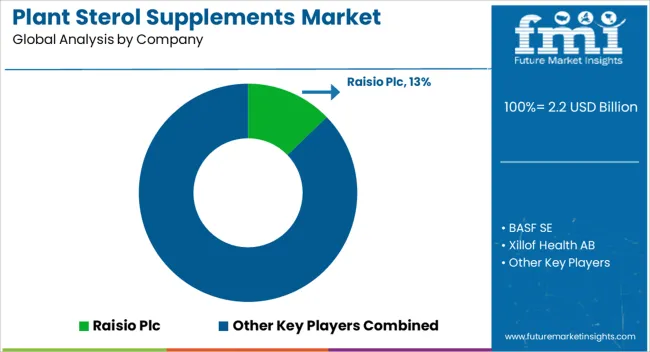
| Item | Value |
|---|---|
| Quantitative Units | USD 2.2 Billion |
| Distribution Channel | Pharmacies/Drugstores, Health & Beauty Stores, Hypermarket/Supermarket, and Internet And Direct Selling |
| Regions Covered | North America, Europe, Asia-Pacific, Latin America, Middle East & Africa |
| Country Covered | United States, Canada, Germany, France, United Kingdom, China, Japan, India, Brazil, South Africa |
| Key Companies Profiled | Raisio Plc, BASF SE, Xillof Health AB, Unilever PLC, Wilmar International Limited, Neste Corporation, Phytofare Labs Australia Pty Ltd, DuPont de Nemours, Inc, Daesang Corp, Stepan Company, The Dow Chemical Company, Archer Daniels Midland Company, and Cargill, Incorporated |
The global plant sterol supplements market is estimated to be valued at USD 2.2 billion in 2025.
The market size for the plant sterol supplements market is projected to reach USD 3.7 billion by 2035.
The plant sterol supplements market is expected to grow at a 5.5% CAGR between 2025 and 2035.
The key product types in plant sterol supplements market are pharmacies/drugstores, health & beauty stores, hypermarket/supermarket and internet and direct selling.
In terms of , segment to command 0.0% share in the plant sterol supplements market in 2025.






Our Research Products

The "Full Research Suite" delivers actionable market intel, deep dives on markets or technologies, so clients act faster, cut risk, and unlock growth.

The Leaderboard benchmarks and ranks top vendors, classifying them as Established Leaders, Leading Challengers, or Disruptors & Challengers.

Locates where complements amplify value and substitutes erode it, forecasting net impact by horizon

We deliver granular, decision-grade intel: market sizing, 5-year forecasts, pricing, adoption, usage, revenue, and operational KPIs—plus competitor tracking, regulation, and value chains—across 60 countries broadly.

Spot the shifts before they hit your P&L. We track inflection points, adoption curves, pricing moves, and ecosystem plays to show where demand is heading, why it is changing, and what to do next across high-growth markets and disruptive tech

Real-time reads of user behavior. We track shifting priorities, perceptions of today’s and next-gen services, and provider experience, then pace how fast tech moves from trial to adoption, blending buyer, consumer, and channel inputs with social signals (#WhySwitch, #UX).

Partner with our analyst team to build a custom report designed around your business priorities. From analysing market trends to assessing competitors or crafting bespoke datasets, we tailor insights to your needs.
Supplier Intelligence
Discovery & Profiling
Capacity & Footprint
Performance & Risk
Compliance & Governance
Commercial Readiness
Who Supplies Whom
Scorecards & Shortlists
Playbooks & Docs
Category Intelligence
Definition & Scope
Demand & Use Cases
Cost Drivers
Market Structure
Supply Chain Map
Trade & Policy
Operating Norms
Deliverables
Buyer Intelligence
Account Basics
Spend & Scope
Procurement Model
Vendor Requirements
Terms & Policies
Entry Strategy
Pain Points & Triggers
Outputs
Pricing Analysis
Benchmarks
Trends
Should-Cost
Indexation
Landed Cost
Commercial Terms
Deliverables
Brand Analysis
Positioning & Value Prop
Share & Presence
Customer Evidence
Go-to-Market
Digital & Reputation
Compliance & Trust
KPIs & Gaps
Outputs
Full Research Suite comprises of:
Market outlook & trends analysis
Interviews & case studies
Strategic recommendations
Vendor profiles & capabilities analysis
5-year forecasts
8 regions and 60+ country-level data splits
Market segment data splits
12 months of continuous data updates
DELIVERED AS:
PDF EXCEL ONLINE
Plant Moisture Tester Market Size and Share Forecast Outlook 2025 to 2035
Plant Genome Extraction Kit Market Size and Share Forecast Outlook 2025 to 2035
Plant Derived Analgesics Market Size and Share Forecast Outlook 2025 to 2035
Plant Based Beverage Market Forecast and Outlook 2025 to 2035
Plant-based Body Paint Pigments Market Size and Share Forecast Outlook 2025 to 2035
Plant Based Plastic Market Forecast and Outlook 2025 to 2035
Plant Stem Cell Encapsulation Market Analysis - Size and Share Forecast Outlook 2025 to 2035
Plant Stem Cell Skincare Product Market Size and Share Forecast Outlook 2025 to 2035
Plant-based Cheese Market Size and Share Forecast Outlook 2025 to 2035
Plant Based Meat Packaging Market Size and Share Forecast Outlook 2025 to 2035
Plant Protein Hydrolysate Market Size and Share Forecast Outlook 2025 to 2035
Plant Asset Management Market Size and Share Forecast Outlook 2025 to 2035
Plant-Derived Hyaluronic Acid Alternatives Market Analysis - Size, Share, and Forecast Outlook 2025 to 2035
Plant Peptides Market Size and Share Forecast Outlook 2025 to 2035
Plant-Based Foam Market Size and Share Forecast Outlook 2025 to 2035
Planting Machinery Market Size and Share Forecast Outlook 2025 to 2035
Plant-based Snacks Market Analysis - Size, Share, and Forecast Outlook 2025 to 2035
Plant Based Meals Market Size and Share Forecast Outlook 2025 to 2035
Plant-Derived Ceramide Alternatives Market Analysis - Size and Share Forecast Outlook 2025 to 2035
Plant-Based Squalane Market Analysis - Size and Share Forecast Outlook 2025 to 2035

Thank you!
You will receive an email from our Business Development Manager. Please be sure to check your SPAM/JUNK folder too.
Chat With
MaRIA